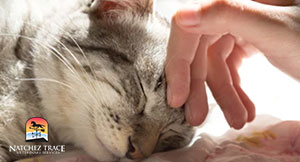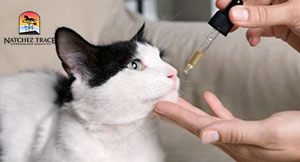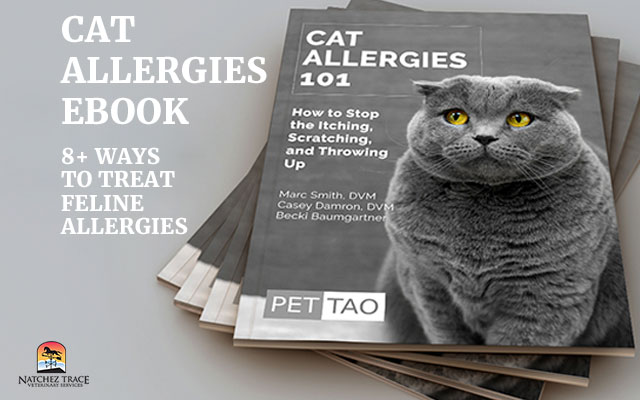Are you and your cat tired of dealing with pesky cat allergies? We understand the struggles that come with feline-induced sensitivities. We’re thrilled to share our free ebook, a comprehensive guide to natural remedies for cat allergies.
Dr. Marc Smith, Dr. Casey Damron, and Becki Baumgartner teamed up to write this ebook, keeping pet parents like you in mind. With many years of experience in veterinary medicine, plus training in alternative medicine and TCVM, they’ve created a book just for you and your beloved pet.
Watch this video of Dr. Smith explaining what you can discover in his Cat Allergies 101 ebook:
Discover effective natural treatments and find relief for your feline friend with our insights into treating cat skin allergies naturally. The ebook provides a sneak peek into a wealth of information so your cats can feel better. Let’s embark on a journey to bring natural allergy relief for your cats.
Understanding Cat Allergies
 Addressing your cat’s allergies can be a challenging journey filled with frustration and the undeniable ache of watching your feline companion endure discomfort.
Addressing your cat’s allergies can be a challenging journey filled with frustration and the undeniable ache of watching your feline companion endure discomfort.
However, amidst this challenge lies an opportunity for empowerment. By delving into the intricacies of your cat’s allergies, you gain invaluable knowledge that enables you to make informed choices, ultimately contributing to your cat’s well-being and comfort. Let’s explore the transformative journey of understanding and treating your cat’s allergies at home.
Let’s start with the basic types of feline allergies and their symptoms.
The Basic Types of Feline Allergies
Embarking on the journey to alleviate your cat’s allergies begins with unraveling the distinct types that may affect our feline friends. By comprehending these variations, you move a crucial step closer to discovering effective solutions.
 The fundamental types of feline allergies encompass:
The fundamental types of feline allergies encompass:
- Breathing Allergies/Asthma
- Food Allergies
- Atopy (Skin Allergies, including Flea Allergies)
The Symptoms of Feline Allergies
Becoming attuned to your cat’s well-being doesn’t necessitate a veterinary degree – certain signs can serve as clear indicators of feline allergies.
Allergic cats often exhibit distinctive symptoms, providing vital clues to their discomfort. These include:
 Sneezing, Wheezing, and Coughing
Sneezing, Wheezing, and Coughing- Irritated, Itchy, or Inflamed Skin
- Itchy, Runny Eyes
- Itchy Back or Base of the Tail (Predominantly seen in flea allergies)
- Recurrent Ear Infections and/or Itchy Ears
- Vomiting
- Diarrhea
- Snoring
By understanding these signals, you empower yourself to identify potential allergies early, paving the way for targeted care and a happier, healthier feline companion.
How to Treat Your Cat’s Allergies at Home
Caring for your cat’s allergies within the comforts of home is a journey that involves understanding, patience, and holistic approaches. Here’s a comprehensive guide on how to treat your cat’s allergies at home:
-
Identify the Allergen:
- Begin by identifying the allergen triggering your cat’s reactions, whether it’s related to food, environmental factors, or specific substances.
-
Dietary Adjustments:
- Consider implementing dietary changes, such as switching to hypoallergenic cat food or identifying and eliminating potential food allergens.
-
 Herbal Supplements:
Herbal Supplements:- Explore the use of herbal supplements known for their anti-inflammatory or immune-boosting properties, such as chamomile or omega-3 fatty acids.
-
Create an Allergy-Friendly Environment:
- Minimize exposure to environmental allergens by keeping living spaces clean, using air purifiers, and creating designated allergy-free zones for your cat.
-
Regular Grooming:
- Establish a regular grooming routine to reduce the presence of allergens on your cat’s fur, particularly in the case of environmental or flea allergies.
-
Topical Remedies for Skin Allergies:
- For skin allergies, consider topical solutions like aloe vera or oatmeal baths to soothe irritated skin and promote healing.
-
Environmental Modifications:
- Implement changes like using allergen-free bedding, choosing unscented litter, and avoiding strong cleaning agents to create a more allergy-friendly home environment.
-
Consult with a Veterinarian:
- While pursuing home remedies, maintain open communication with your veterinarian. Seek their guidance, especially if symptoms persist or worsen.
-
Holistic Approaches:
- Explore holistic approaches like acupuncture or homeopathy to address underlying issues contributing to allergies.
-
Monitor and Adjust:
- Regularly monitor your cat’s response to the implemented changes and be prepared to make adjustments based on their individual needs and reactions.
Remember, each cat is unique, and finding the right combination of treatments may require some trial and error. By incorporating these holistic strategies, you can provide your feline companion with personalized, at-home care for their allergies.
Get The Info You Need to Help Your Cat
 Get your free cat allergies ebook today to learn about the “allergy threshold” and get tips on what you can do at home to make your cat feel better today.
Get your free cat allergies ebook today to learn about the “allergy threshold” and get tips on what you can do at home to make your cat feel better today.
Our ebook is written by holistic veterinarians Dr. Marc Smith and Dr. Casey Damron.
Both veterinarians have been in private practice for over 20 years and have helped hundreds of cats overcome irritating allergy symptoms.
Get your free ebook today and learn their cat allergy secrets!








